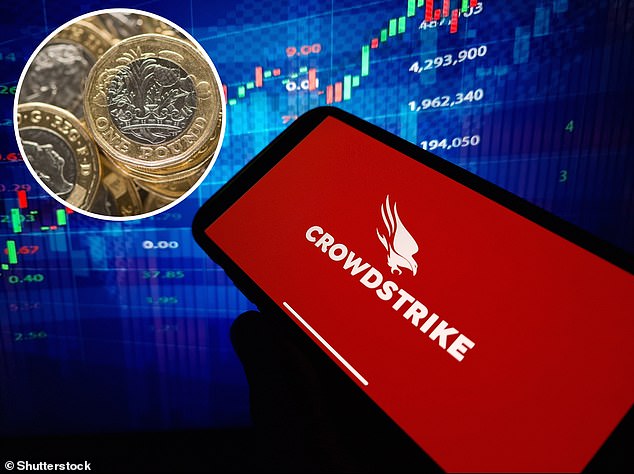Table of Contents
In recent years, Britons have been losing their love for cash in favour of digital wallets and contactless payments.
Nearly four in ten UK adults will be living largely cashless during 2023, a new report from UK Finance suggests.
The number of cash payments last year fell to six billion, with cash accounting for just 12 percent of the 48.1 billion payments recorded last year.
But while many UK adults now live largely cashless lives, the number of people primarily using cash in 2023 actually rose to 2.6 per cent of the population or 1.5 million adults, the first increase since 2019.
CrowdStrike service outage highlighted vulnerabilities in digital payment systems
UK Finance attributed this to the cost of living crisis, with some claiming that using physical cash helps them stick to a budget.
Debit cards are the most popular payment method, accounting for 51 per cent of all payments made in 2023, and almost four in ten payments made in the UK during 2023 were contactless.
There has also been mass adoption of digital wallets by Britons, separate data from card-issuing platform Marqeta reveals.
In the past seven days alone, 80 percent of UK consumers surveyed reported using contactless payments.
And 68 percent of adults now say they would be comfortable leaving their wallets at home.
The $6 billion in cash payments made in 2023 reversed the 2022 increase of $6.4 billion. In 2022, cash accounted for 14% of all payments, marking the first increase in cash payments in a decade.
Overall, cash remains the second most commonly used payment method in the country, varying slightly by age.
Around three million people rely on cash, according to research by the Financial Conduct Authority.
The FCA found that being from a low-income household (those with an annual household income of less than £15,000 a year) and having low digital capability or access had the strongest association with cash dependency.
Digital exclusion, measured through reduced digital capability or poor digital access, makes a person four times more likely to rely on cash than a person who is not digitally excluded.
A person in a low-income household is almost three times more likely to rely on cash, while being unemployed makes an individual almost twice as likely to rely on cash.
Adrian Buckle, head of research at UK Finance, said: ‘There is a huge amount of choice available to consumers in terms of how they make payments, but we can definitely see the continued popularity of debit and contactless cards.
‘Contactless mobile payments are growing rapidly, with a third of adults now making them at least once a month, and there is scope for their use to increase further.
“This doesn’t mean we’re on track to become a cashless society. Cash remains the second most commonly used method of payment in the UK, although overall we’re using it less and more people are living a virtually cashless life.
‘Over the next decade, we predict that the long-term trend of declining cash use and the growth of some other payment methods, such as cards and faster payments, will continue.’
Cash remains vital if systems fail
Growing reliance on cashless payments could leave customers vulnerable in the future, experts say.
Last week, a CrowdStrike software update caused a global computer system outage.
In addition to grounded planes and cancelled surgeries, banking and payment systems were also out of service. Some customers found themselves unable to make card payments in stores or access mobile banking.
Global disruption reinforces the importance of having an alternative payment option when things go wrong
Alice Haine from the Best Invest investment platform
In cases like this, cash could still be an essential lifeline for many if digital payments fail.
John Howells, chief executive of ATM operator Link, said: “People continue to choose new ways to pay and cash continues to be used less. But it remains vital for millions of people, even if data predicts cash will account for just six per cent of payments within a decade – it is critical if other systems fail, as we saw with the outage last week.
“Even though people are moving away from cash, our network is still issuing £1.6 billion a week. We remain absolutely committed to ensuring people can access cash freely and conveniently on the streets.”
But the digital payments industry is confident that the disruption will not affect the adoption of virtual wallets.
Marcin Glogowski from Marqeta said: ‘What we’re seeing is that UK consumers are increasingly choosing instant digital financial options that work for them.
‘Rather than consumer confidence being shaken by the recent IT disruption, I believe we will continue to see increased consumer adoption of new and innovative financial options such as digital banks, embedded finance and earlier access to salary programs.’
SAVE MONEY, EARN MONEY

Boosting investment

Boosting investment
5.09% cash for Isa investors

Cash Isa at 5.17%

Cash Isa at 5.17%
Includes 0.88% bonus for one year

Free stock offer

Free stock offer
No account fees and free stock trading
5.78% savings
5.78% savings
You have 365 days’ notice

Transaction fee refund

Transaction fee refund
Get £200 back in trading commissions
Affiliate links: If you purchase a product This is Money may earn a commission. These offers are chosen by our editorial team as we believe they are worth highlighting. This does not affect our editorial independence.
Some links in this article may be affiliate links. If you click on them we may earn a small commission. This helps us fund This Is Money and keep it free to use. We do not write articles to promote products. We do not allow any commercial relationships to affect our editorial independence.


